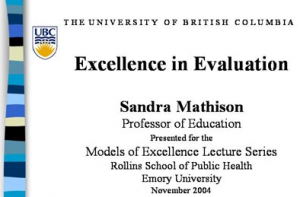As part of Emory University’s Series on Excellence, I gave a talk on excellence in evaluation. You can listen to this presentation on the Emory website.
Canadian University presidents refuse to participate in flawed rankings game
Canada has so few universities compared to countries like the USA but that doesn’t stop Macleans Magazine from sponsoring a horse race among them. Because the number of institutions is small it is relatively easy to analyze which one best suits your needs by looking at data available from each. And, Macleans expects universities to foot the bill by expending resources and time to answer their questions, which simplify and average out important differences any consumer would want to know about.
UBC’s new president, along with the other university presidents, is to be commended for taking a stand and refusing to participate in a simplistic evaluation system. The letter, sent to Macleans, was signed by eleven university presidents–most of the biggies, but not McGill.
What is the difference between an 89 and a 90? Or rate that wine for profit!
Here is an excerpt from a NYT story that critiques the 100 point rating system for wines. The ratings have become more useful for selling wine than actually judging them, and thus the difference between and 89 and a 90 is absurd in an evaluative sense, but worth lots of $s as a marketing tool.

A rating system that draws a distinction between a cabernet scoring 90 and one receiving an 89 implies a precision of the senses that even many wine critics agree that human beings do not possess. Ratings are quick judgments that a single individual renders early in the life of a bottle of wine that, once expressed numerically, magically transform the nebulous and subjective into the authoritative and objective.
When pressed, critics allow that numerical ratings mean little if they are unaccompanied by corresponding tasting notes (“hints of blackberry,” “a good nose”). Yet in the hands of the marketers who have transformed wine into a multibillion-dollar industry, The Number is often all that counts. It is one of the wheels that keep the glamorous, lucrative machinery of the wine business turning, but it has become so overused and ubiquitous that it may well be meaningless — other than as an index of how a once mystical, high-end product for the elite has become embroidered with the same marketing high jinks as other products peddled to the masses.
Read the whole story.
The never-ending story of grade inflation
Once again the Chronicle of Higher Education covers the story everyone already knows–grade inflation has gone to college. Read When B’s are Better if you are the only person not familiar with this topic. The nostalgia for the days of higher standards and fewer A’s misses most of what is important about the relationship between grades and what students know and can do. It is, of course, entirely possible for everyone to get an A (which is not to say that is currently the case) but that requires a criterion based approach to assessment. Most arguments about grade inflation simply invoke the normal curve as the natural distribution of knowledge. Rather than asking professors to give fewer A’s it would be more interesting to ask professors to clarify what they think the A they are giving means. In other words, specify the meaning of the grade, not necessarily change it. And, all of this talk about grade inflation dodges the complexity of the higher education context where grades are fetishes for students and become the currency that allows faculty and students to get what they want within a system not necessarily friendly to either.
Good summary of news in education
Alexander Russo’s blog This Week in Education provides a recap on much news about education, and especially issues around standardized testing, high stakes testing anad evaluation in schools.
Student Experiences of High Stakes Testing
The concluding component of a five year NSF funded research project exploring the impacts of state mandated testing in elementary and middle schools in three upstate NY districts is a small study of kid’s perceptions of the experience. Over a year we meet with a small group of 4th and 8th graders–they provided an array of data including journalling, drawing and interviews. Many of the images and an analysis of some of these images is posted on my website.
Logic Models–learn the basics in 15 minutes!
Eric Greg of Usable Knowledge has created a tutorial that gives the basics of logic modelling in about 15 minutes. Naturally there is more to be learned, especially once you actually try to create a logic model but this will familiarize you with the terms, intents, and processes.
American Evaluation Association annual meeting Nov 1 – 4, 2006
The meeting will be held in Portland OR and the theme is the “consequences of evaluation.” more info
Alfie Kohn on Higher Standards
Check out Alfie Kohn’s talk on the folly of raising standards especially with high stakes standardized testing.
The promise and peril of high stakes accountability
Wayne Ross and I published a short piece on the topic in the BC Teacher Federation magazine. The article is available online

 Follow
Follow
